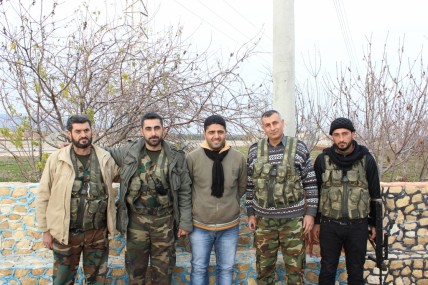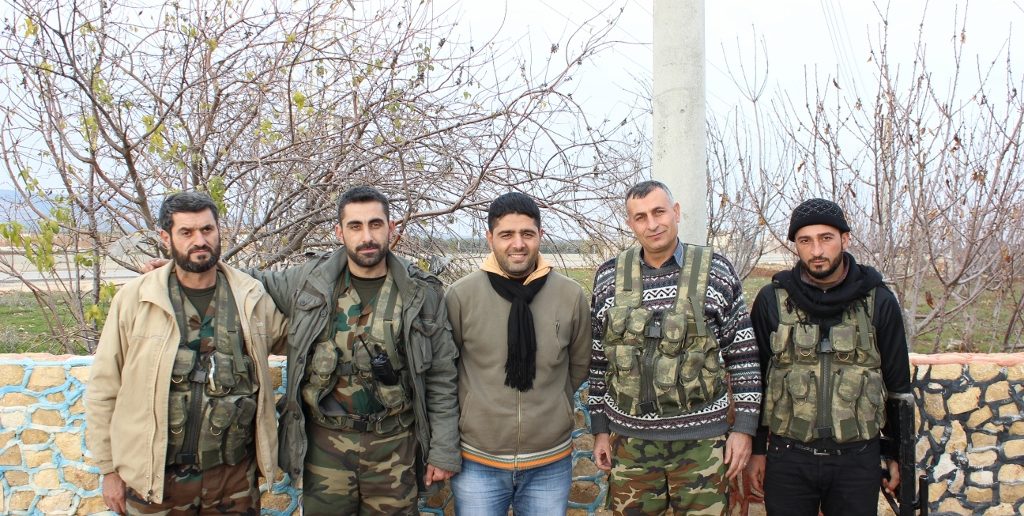
Bewar Mustafa, Shawqi Othman, and other Saladin Brigade members. Photograph by Mohammed Sergie
Fighters of the Kurdish Saladin Brigade greet visitors with marhaba, hello, rather than the Islamic salam alikum. They lack the bushy beards that mark the more conservative Muslims who fight alongside them in the battlefields. It’s a marriage of convenience: secular Kurds joining with Islamist groups to gain more traction in the fight against President Bashar al Assad.
Saladin Brigade, which includes Arab members in its ranks, says its alliance with Islamists is a way to pay its dues to the revolution. Its leaders hope to bring down the Assad regime and play an influential, and moderating, role in a future Syria.
“We want a civil, democratic government which treats everyone equally,” said Colonel Shawqi Othman, 43, who heads the brigade.
Othman said that as a bid to gain strength and credibility, Saladin fighters split up and joined other rebel groups. Even though they don’t align on ideology, some are now embedded with some of the biggest Islamist fighting forces in Aleppo, like Tawhid, Al Fath and Ahrar Syria Brigades.
Othman said he met with Jabhat al Nusra fighters a few weeks ago, and the discussion turned toward the vision for a future Syria. “They want the Islamic Caliphate but we want democracy, and this is a clear difference of opinion,” he said.
The Saladin Brigade is small, with roughly 30 fighters and 200 in reserve, waiting for a weapon so they can join the battle. It’s part of the Kurdish Military Council, which is a member of the Western-backed Supreme Military Council. Their goal is to create a disciplined Kurdish unit of the future National Army; their hope is that such a unit could prevent the disintegration of the country and assuage the fears of minorities, who fear the rise of Islamist groups.
“We are working toward the fall of the regime but are planning beyond that,” Othman said.
Their choice to fight on the rebel side pits them against their ethnic brethren in the Kurdish Workers’ Party, or PKK, which is based in Turkey. The secessionist PKK is allied with the Assad regime and is in de facto control of Kurdish towns along Syria’s northern border. In the eyes of the U.S. and Turkish governments, the PKK is a designated terrorist group.
There’s been open conflict between PKK fighters and rebel groups along the border. And between the PKK and the Saladin Brigade, there’s clearly bad blood. One of the brigade’s founders, Captain Bewar Mustafa, 32, the first Kurdish officer to defect from the Assad regime, says he’s on the PKK’s hit list as are some of his comrades.
When Mustafa defected in May, he joined other former officers in Rastan, a town north of Homs that used to be known for its dam on the Orontes River and now has gained recognition for its ferocious battles. A calm and measured engineer, he represented officers in Rastan in meetings with U.N. observers. He said he tried to gain legitimacy for the armed struggle by demonstrating the presence of defected soldiers, dispelling the claim that the rebels are armed gangs and terrorists.
Unlike many fighters in Syria, civilians who never intended to pick up a gun and will likely leave the battle when it’s over, Mustafa dreams of staying on to build a professional army. He wants to create “an independent, nonpolitical institution that protects the nation from external and internal threats, and not a militia that acts according to the interest of a regime,” he said.
In any future Syria, Mustafa says protecting Syria’s Christians will be a major focus for the Saladin Brigade. Christians and Kurds share neighborhoods and towns in the country’s northeast; Christians fear that with a more conservative Muslim culture moving into the mainstream, their security in Syria will be threatened and their way of life torn apart.
But securing their Christian neighbors could be a challenge for Kurds if an extremist Islamic ideology takes hold. As with many issues in Syria, the one between moderate and radical Islam might have to be settled on the battlefield.
For now, the Saladin Brigade wants it to be known that they will fight for a democratic agenda that serves Syrians.
“They have men and weapons but so do we,” Othman said about the more extremist rebel groups. “We have proven ourselves, as Kurdish fighters, that we can win difficult battles.”
Written by Mohammed Sergie




